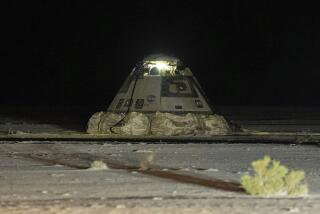Hydraulic Fault Delays Shuttle, Space Telescope
- Share via
KENNEDY SPACE CENTER, Fla. — Failure of a hydraulic system aboard the space shuttle Discovery Tuesday forced NASA to delay the launch of the long-awaited Hubble Space Telescope for one to two weeks.
The shuttle was within four minutes of blasting off when the mission was scrubbed to the profound disappointment of scientists who have waited for years to see the revolutionary telescope launched into orbit 380 miles above the Earth.
“I don’t know how many days of this we can take emotionally,” said Edward J. Weiler, project scientist for the National Aeronautics and Space Administration. Like other scientists who have lived through years of delays in launching the $2-billion telescope, Weiler seemed depressed but resigned to the uncertainties of space flight.
“We’ve waited 13 years,” he said. “We can wait a few more days.”
The trouble began when the Discovery’s three “auxiliary power units” were turned on five minutes before the shuttle was scheduled to lift off at 5:47 a.m. PDT Tuesday. The units drive the hydraulic system that runs nearly all the mechanical parts of the shuttle, including all aerodynamic controls and even the landing gear.
“The units are used to steer the orbiter,” said launch director Robert Sieck, who ordered the scrub. “They are obviously mandatory.”
Only one unit indicated it was malfunctioning, so the crew would not have been in danger even if the problem had occurred during liftoff because redundancies in the system would have prevented disaster, Sieck said. But NASA regulations do not permit a launch without that added margin of safety.
“When we have problems, we do like to find them on the ground,” Sieck said.
Workers will have to remove the failed unit from the shuttle and either fix it or replace it, a procedure that will take about a week. In addition the batteries inside the space telescope will have to be recharged--an involved process that could take up to eight days.
The six nickel hydrogen batteries slowly discharge themselves while the shuttle sits on the launch pad, and NASA had only four days to launch the Discovery before it would have been necessary to delay the launch for eight days so the batteries could be recharged.
While on orbit, the batteries will be charged continuously by the telescope’s solar arrays.
Officials were hoping to set a new launch date today and it was not clear whether the delay will force a postponement in other launches now set for the coming weeks.
Meanwhile, the all veteran crew of the Discovery was expected to return to Houston to wait for further orders. The Discovery is commanded by Loren Shriver, 45. The pilot is Charles F. Bolden, 43, and the mission specialists are Bruce McCandless, 52, Steven A. Hawley, 38, and Kathryn D. Sullivan, 38.
More to Read
Sign up for Essential California
The most important California stories and recommendations in your inbox every morning.
You may occasionally receive promotional content from the Los Angeles Times.













